Bossa nova is a style of samba developed in the late 1950s and early 1960s in Rio de Janeiro, Brazil. It is mainly characterized by a "different beat" that altered the harmonies with the introduction of unconventional chords and an innovative syncopation of traditional samba from a single rhythmic division. The "bossa nova beat" is characteristic of a samba style and not of an autonomous genre.

Antônio Carlos Brasileiro de Almeida Jobim, also known as Tom Jobim, was a Brazilian composer, pianist, guitarist, songwriter, arranger, and singer. Considered one of the great exponents of Brazilian music, Jobim internationalized bossa nova and, with the help of important American artists, merged it with jazz in the 1960s to create a new sound, with popular success. As a result, he is sometimes known as the "father of bossa nova".
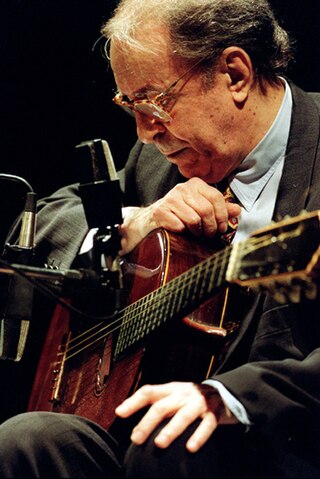
João Gilberto was a Brazilian guitarist, singer and composer who was a pioneer of the musical genre of bossa nova in the late 1950s. Around the world, he was often called "father of bossa nova"; in his native Brazil, he was referred to as "O Mito".
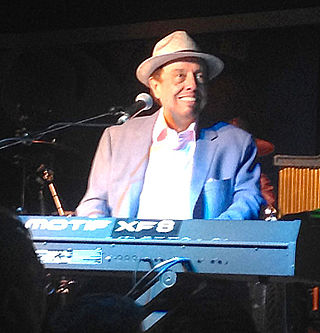
Sérgio Santos Mendes is a Brazilian musician. His career took off with worldwide hits by his group Brasil '66. He has over 55 releases and plays bossa nova heavily crossed with jazz and funk. He was nominated for an Oscar for Best Original Song in 2012 as co-writer of the song "Real in Rio" from the animated film Rio.

Getz/Gilberto is an album by American saxophonist Stan Getz and Brazilian guitarist João Gilberto, featuring pianist and composer Antônio Carlos Jobim, who also composed many of the tracks. It was released in March 1964 by Verve Records. The album features the vocals of Astrud Gilberto on two tracks, "Garota de Ipanema" and "Corcovado". The artwork was done by artist Olga Albizu. Getz/Gilberto is a jazz and bossa nova album and includes tracks such as "Desafinado", "Corcovado", and "Garota de Ipanema". The last received a Grammy Award for Record of the Year and started Astrud Gilberto's career. "Doralice" and "Para Machucar Meu Coração" strengthened Gilberto's and Jobim's respect for the tradition of pre-bossa nova samba.

Dom Um Romão was a Brazilian jazz drummer and percussionist. Noted for his expressive stylings with the fusion band Weather Report, Romão also recorded with varied notable artists such as Cannonball Adderley, Paul Simon, Antonio Carlos Jobim, Jorge Ben, Sergio Mendes and Brasil '66, and Tony Bennett. He was the percussionist Tom Jobim brought to the studio for the album Jobim recorded with Frank Sinatra in 1967 for Reprise Records, Francis Albert Sinatra & Antônio Carlos Jobim.
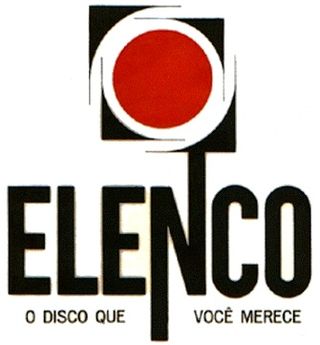
Elenco is a Brazilian record label established in 1963 by Aloysio de Oliveira. It was a major factor in the development of the bossa nova style, also releasing samba, jazz, and spoken word recordings. It is often considered one of the most influential labels in the bossa nova and MPB genres.
"Corcovado" is a bossa nova song and jazz standard written by Antônio Carlos Jobim in 1960. English lyrics were later written by Gene Lees. The Portuguese title refers to the Corcovado mountain in Rio de Janeiro.

João Donato de Oliveira Neto is a Brazilian jazz and bossa nova pianist from Brazil. He first worked with Altamiro Carrilho and went on to perform with Antonio Carlos Jobim and Astrud Gilberto.
"Samba de uma Nota Só", known in English as "One Note Samba", is a bossa nova and jazz standard song composed by Antônio Carlos Jobim with Portuguese lyrics by Newton Mendonça. The English lyrics were written by Jon Hendricks. It was first recorded by João Gilberto in 1960 for his album O Amor, o Sorriso e a Flor.
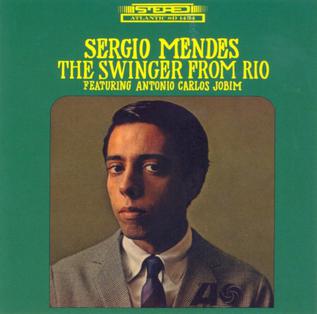
The Swinger from Rio is a 1966 album by Sérgio Mendes. Recorded over three days in December 1964 for the Atlantic label, it features guest artists Phil Woods, Art Farmer, and Hubert Laws, plus Antônio Carlos Jobim on rhythm guitar. It has also been released under the title Bossa Nova York.

Paulo Moura was a Brazilian clarinetist and saxophonist.
Ugo Marotta is a Brazilian musician, conductor, arranger, composer, keyboards and vibraphonist. He took part at the Brazilian music movements Bossa Nova and Musicanossa.

I Love Brazil! is a 1977 studio album by Sarah Vaughan, accompanied by prominent Brazilian musicians Milton Nascimento, Dori Caymmi, and Antônio Carlos Jobim.
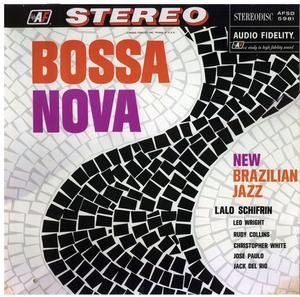
Bossa Nova: New Brazilian Jazz is an album by Argentine composer, pianist and conductor Lalo Schifrin recorded in 1962 and released on the Audio Fidelity label. The album was released during the height of the popularity of bossa nova music in the early 1960s and was one of Schifrin's earliest solo albums after leaving Dizzy Gillespie's band.
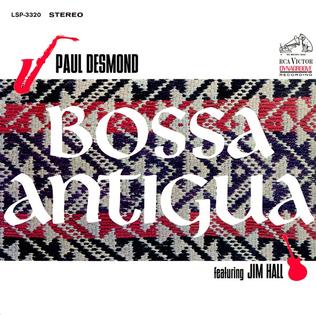
Bossa Antigua is an album recorded by American jazz saxophonist Paul Desmond featuring performances recorded in 1964 which were released on the RCA Victor label. The album title is a word play on bossa nova, the genre of Brazilian music that inspired the album. "Bossa Antigua" loosely translates in English to "old thing", though "antigua" is a Spanish word rather than Portuguese. Antigua is also the name an island in the West Indies popular with North American tourists.

Do the Bossa Nova with Herbie Mann is an album by American jazz flautist Herbie Mann recorded in 1962 for the Atlantic label.

Latin Fever is an album by American jazz flautist Herbie Mann recorded for the Atlantic label and released in 1964. The album features tracks from the 1962 sessions that produced Do the Bossa Nova with Herbie Mann with more recent recordings.
"Once I Loved" is a bossa nova and jazz standard song composed in 1960 by Antônio Carlos Jobim, with lyrics by Vinícius de Moraes. Words in English were later added by Ray Gilbert. In a few early cases, the song was also known as, a translation into English of the original Portuguese title.
"Só Danço Samba" is a bossa nova song composed in 1962 by Antônio Carlos Jobim, with lyrics by Vinicius de Moraes. English lyrics were later written by Norman Gimbel. On occasion, it has also been known as "Jazz Samba" and "I Only Dance Samba", an English translation of the original Portuguese title.














